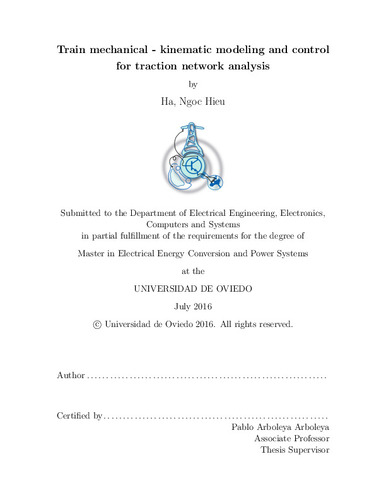Train mechanical - kinematic modeling and control for traction network analysis
Autor(es) y otros:
Director(es):
Palabra(s) clave:
Train model
Train control
Traction network
Fecha de publicación:
Serie:
Máster Universitario Erasmus Mundus en Transporte Sostenible y Sistemas Eléctricos de Potencia (EMMC STEPS)
Descripción física:
Resumen:
Modern railways systems nowadays has been subjected to extensive research and development. Researchers' attention are increasingly paid to various topics ranging from planning and operation of the whole traction network to more specific aspects of the train itself such as train trajectory, predictive control, train stop control, braking strategy, etc. Whether the focus is on a bigger scale of energy management to a local scale of different algorithms for automatic train operation (ATO), the ultimate goal is to optimize the aspects of energy efficiency, punctuality and passenger comfort. The first step to such a big chain of researches is to model the mechanical - kinematic behavior of the train as well as to figure out how the train is controlled with respect to time, speed and distance. This master thesis will firstly cover a review of train model, afterwards a number of control loops will be implemented and simulated by Matlab. Different conditions of the railroad and various constraints in train's characteristic parameters will be taken into account when simulating the model and discussed thereafter. Though not necessarily being state of the art of train control, the simulator is useful for characterizing the mechanical behavior of the train, whose resulting variables will be integrated into a traction network solver to verify and form a full train traction system simulation towards the later part of the thesis. Since the power flow electric solver is very complex, the goal of the thesis is to have a fast and simple train simulators, rather than very accurate and using complicated algorithms
Modern railways systems nowadays has been subjected to extensive research and development. Researchers' attention are increasingly paid to various topics ranging from planning and operation of the whole traction network to more specific aspects of the train itself such as train trajectory, predictive control, train stop control, braking strategy, etc. Whether the focus is on a bigger scale of energy management to a local scale of different algorithms for automatic train operation (ATO), the ultimate goal is to optimize the aspects of energy efficiency, punctuality and passenger comfort. The first step to such a big chain of researches is to model the mechanical - kinematic behavior of the train as well as to figure out how the train is controlled with respect to time, speed and distance. This master thesis will firstly cover a review of train model, afterwards a number of control loops will be implemented and simulated by Matlab. Different conditions of the railroad and various constraints in train's characteristic parameters will be taken into account when simulating the model and discussed thereafter. Though not necessarily being state of the art of train control, the simulator is useful for characterizing the mechanical behavior of the train, whose resulting variables will be integrated into a traction network solver to verify and form a full train traction system simulation towards the later part of the thesis. Since the power flow electric solver is very complex, the goal of the thesis is to have a fast and simple train simulators, rather than very accurate and using complicated algorithms
Colecciones
- Trabajos Fin de Máster [5253]
Ficheros en el ítem





